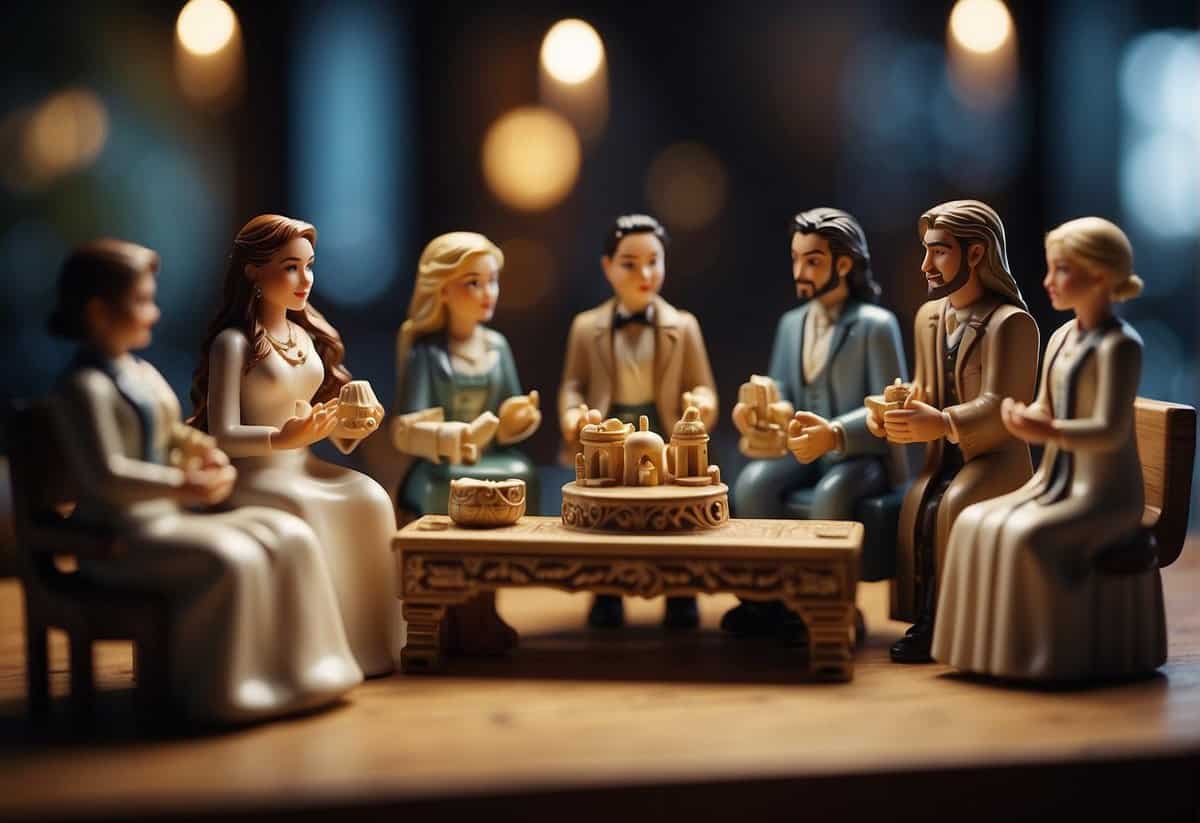Is It Really Important to Get Married? Unpacking the Significance of Matrimony
When pondering the question of whether it’s really important to get married, you’re tackling a subject that intertwines with deep personal values, societal norms, and historical traditions. For many, marriage represents a significant milestone—a celebration of love, a commitment to partnership, and often, a foundation for starting a family. Others view it as a socio-economic arrangement that may offer legal and financial benefits. While the institution of marriage has stood as a central pillar in societies around the world for centuries, modern perspectives on marriage are diverse, reflecting changes in cultural norms and individual priorities.

Addressing the importance of marriage often leads to a broader conversation about relationships and life choices. Your personal and emotional aspirations, cultural background, and life experiences all play a crucial role in shaping your view on this matter. It’s worth considering the variety of perspectives and motivations that lead people towards or away from marriage, as well as exploring alternative forms of long-term relationships that are becoming more prevalent in contemporary society.
Key Takeaways
- Marriage intertwines with personal, societal, and cultural dimensions of life.
- The significance of marriage varies greatly across different individuals and communities.
- Alternatives to marriage are gaining popularity as societal norms continue to evolve.
Cultural and Social Significance

When you think about marriage, understanding its cultural and social underpinnings might help you grasp why it’s valued differently around the world. Traditions, societal norms, and religious laws often shape how you perceive and engage with the institution of marriage.
Influence of Traditions
Traditions often define the way you celebrate marriage through various ceremonies. These rituals pass down through generations, symbolizing the unity and commitment between partners. They vary greatly; some might involve elaborate feasts and multi-day celebrations, while others are more subdued and intimate. Whether it’s jumping over a broom or circling a sacred fire, these traditions serve to honor the couple and their new journey together.
Marriage in Different Societies
Marriage holds different weights depending on the society you look at. In some societies, marriage is synonymous with status and can affect social dynamics. For example, a survey in the United States suggests a shift, with more people tying the knot later in life. This reflects how societal attitudes can evolve, also highlighting variations in how different cultures prioritize marriage.
Religious and Legal Perspectives
From a religious viewpoint, many faiths view marriage as a sacred bond and provide specific guidelines for marital life, significantly impacting how you approach marriage. Legally, marriage confers a host of rights and responsibilities, from tax benefits to decision-making in health care. The law treats marriage as a binding contract, which is why you’ll find a volume of legal benefits associated with the state of being married. Understanding these aspects gives you insight into why marriage can often feel like a universal goal in many cultures.
Personal and Emotional Aspects

In considering marriage, your personal and emotional growth plays a critical role. Love and companionship foster happiness, while commitment solidifies trust, offering you a fulfilling life enriched with care.
Love and Companionship
Experiencing love in marriage can be a profound and unparalleled source of joy. It’s a journey where you venture through life’s peaks and valleys with a partner by your side—someone to share your happiness and support you unconditionally. A deeper level of intimacy often results from this bond, allowing for a safe space where vulnerability turns into emotional strength.
Commitment and Stability
Commitment in marriage translates to a promise of showing up—every single day. It’s about building a foundation of trust and care, knowing that both of you are dedicated to maintaining the well-being of the relationship. This commitment can also lead to a sense of stability and security, as having a shared vision of the future places you and your partner on common ground.
Personal Fulfillment
When you marry with the right intentions, it can be a key to unlocking a fulfilling life. The emotional support, shared experiences, and personal growth fostered within a marriage can contribute greatly to your individual fulfillment. Companionship and shared commitment often result in a life that feels more complete, surrounded by love and mutual care.
Socioeconomic Factors
In considering marriage, it’s essential to understand the role socioeconomic factors play in shaping both your outlook and experience. Your financial stability, education level, racial background, and access to health benefits are significant aspects to consider.

Financial Considerations
Marriage can mean combined resources and potential financial stability. For instance, pooling your income with your partner might provide more opportunities for investment and purchasing power. However, it’s also important to recognize that disparities in financial resources can put strain on a relationship, leading to tension and disagreements over money management.
Educational and Racial Correlations
Your education and race often intersect with marital trends. Economists have noted that individuals with higher levels of education tend to marry at older ages, usually after achieving a degree of career stability. Additionally, different racial groups can experience varying marriage rates and structures due to social and economic factors, which can influence decisions about marriage. The patterns of marriage and education showcase a complex web of how socioeconomic status shapes relationship dynamics.
Health and Insurance Benefits
Access to health insurance is a practical consideration that might influence your decision about marriage. Being married can often lead to better access to family health insurance plans, which can be more affordable than individual plans. Good health and the security of insurance coverage are undeniable benefits that contribute to a stable and less stressful life. Understanding the health benefits of marriage can help you weigh this aspect in your decision-making process.
Challenges and Alternatives to Marriage

When considering the institution of marriage, it’s important to recognize both the potential challenges, like divorce, as well as the existence of various alternatives that can be more aligned with your personal beliefs or lifestyle.
Divorce and Relationship Challenges
Divorce can be a significant concern when you’re weighing the decision to marry. Pew Research Center notes changing trends in societal attitudes towards marriage and divorce, which may influence your thoughts on these institutions. For example, what was once perceived as a lifelong commitment is now entered into with the understanding that divorce is a possibility if the relationship faces insurmountable problems. In the U.S., among adults who have ever married, about one in four have been divorced at least once.
Cohabitation vs. Marriage
Cohabitation, where you live with your partner without being legally married, has become an increasingly popular alternative to marriage. This arrangement allows you to enjoy many aspects of married life, such as intimate partnership and shared living space, without the legal ties of marriage. Some couples see cohabitation as a test to determine the durability of their relationship before committing to marriage.
Changing Marriage Rates and Views
Marriage rates have been changing, and your views might be too. Recent data shows that there is a decline in marriage rates among U.S. adults, pointing towards shifting cultural norms. People are prioritizing individual growth, careers, or other forms of personal fulfillment over marriage. There’s also a growing acceptance of different family structures and recognition of the several alternatives to marriage, ranging from common-law arrangements to polyamorous relationships.
Frequently Asked Questions

Marriage is often seen as a significant life event. These FAQs will help you understand different aspects of marriage and what it might mean for you.
What are the main benefits of getting married?
The benefits of getting married typically include emotional support, financial stability, and the joys of companionship. Legally, marriage offers certain rights and protections that unmarried couples may not have.
How does marriage impact one’s life from a religious perspective?
In many religions, marriage is viewed as a sacred bond. It’s often seen as a commitment before God, which can lead to a spiritually fulfilling life aligning with one’s religious values and community practices.
Is there a social or psychological importance to marriage?
Socially, marriage can elevate your status and provides a recognized structure for family life. Psychologically, it has the potential to create a sense of security and partnership that contributes to mental well-being.
Can a person lead a fulfilling life without ever getting married?
Absolutely. Personal fulfillment is subjective and can be achieved through various means—not just marriage. Many people find satisfaction in friendships, careers, hobbies, or other personal endeavors.
What reasons do individuals often cite for choosing to marry?
People often choose to marry for love, the desire to start a family, or to make a public commitment to their partner. Sometimes, practical reasons such as financial benefits are also significant.
How does marriage affect legal and financial status?
Marriage changes your legal standing in many ways, including tax benefits, inheritance rights, and hospital visitation rights. From a financial perspective, marriage can lead to joint property ownership and shared financial responsibilities.


